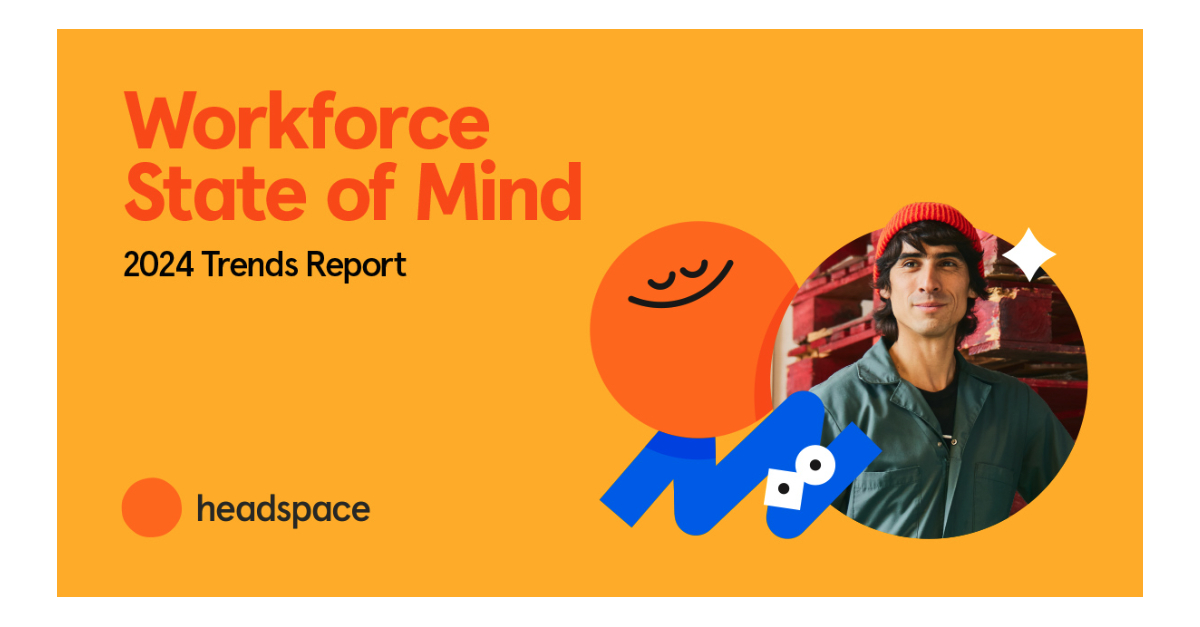
SANTA MONICA, Calif.–(BUSINESS WIRE)–Headspace, the provider of the world’s most accessible, comprehensive mental health system, today announced the launch of its sixth annual Workforce State of Mind report, revealing new data on the perceptions of CEOs, HR leaders, and workers on mental health. Based on a global survey fielded between January and February 2024, the report compiles data from more than 2,000 CEOs and workers in the U.S. and the U.K. on trends impacting their emotional and physical health at work, and nearly 250 HR leaders in the U.S. and U.K., on the unique stressors faced by people leaders with benefits decision-making.
Since 2020, the number of employees who reported that their company leaders talk openly about their personal mental health has more than doubled – up from only 35% in 2020 to 89% in 2024. While it’s promising that workplace dialogue about mental health has become more commonplace, Headspace’s new research points to work stress as a significant contributor to declining employee health and wellbeing in and outside of work.
“Despite the overwhelmingly negative impact employees experience when work stress seeps into their personal lives, our data shows there’s a clear upside for businesses that prioritize cultural transformation in the workplace and invest in evidence-based, high-quality mental health support for their workers. 97% of the employees we surveyed reported feeling better after using company-provided mental health benefits,” said Karan Singh, COO and Chief People Officer, Headspace. “With access to compassionate, outcomes-driven care, employers can see and measure the difference in employee wellbeing.”
Work stress is driving divorce, parenting pitfalls, and poor physical health.
- 77% of employees say that work stress has negatively impacted their physical health and 75% say it caused them to gain weight.
- 71% of employees report that work stress has caused a personal relationship to end, with Gen X employees being more likely (79%) than any other generation to report that work stress has led to a breakup or divorce.
- Nearly 40% of employees report that work has negatively impacted their ability to care for their family or children’s mental health.
- 37% of employees report that work stress has contributed to serious mental health challenges, such as substance use or suicidal ideation.
With managers and HR leaders on the frontlines of the workplace mental health crisis, business success hinges on a deeper investment in mental health and resiliency training as well as cultural transformation.
- While 48% of employees report turning to their managers for mental health support, only one-fourth of HR leaders say managers are required to take mental health-specific training.
- 43% of employees say their managers have negatively impacted their mental health by lacking an understanding of their life outside of work or by treating team members unequally.
- Nine in 10 CEOs say they’re concerned about employees’ mental strength to respond to changes, and nearly half (49%) of HR leaders report an increase in mental health leaves of absence.
A sense of community keeps employees engaged and combats the growing loneliness crisis.
- Despite a shift to remote work for many, employees continue to see the workplace as a source of community and connection: 53% of employees say that the workplace helped them find a community of people with similar backgrounds or lived experiences.
- 44% of employees say that their workplace helped them build connections and feel less lonely.
- With 98% of employees reporting that global trends impact their mental health at work, an investment in forming and supporting employee resource groups (ERGs) – which offer a safe space for employees to connect, and an opportunity to foster dialogue where people can share their lived experiences in the workplace – is more important than ever before.
“Now, more than ever, it’s crucial for employers to show their employees how valued they are as individuals by offering comprehensive, quality programs that support their mental wellbeing. After launching Headspace’s full suite of offerings to our Regions Bank employees, we are already seeing solid results. Most importantly, Headspace is helping to remove some of the stigma that has existed around mental health,” said Mike Branca, Head of Total Rewards, Regions Bank. “The partnership complements our focus on consistently offering a workplace culture that prioritizes not only the needs of our customers but also the wellbeing of our people who are driving the services we deliver every day.”
For more information on Headspace’s 2024 Workforce State of Mind report, visit https://get.headspace.com/2024-workforce-state-of-mind.
About Headspace
Headspace is your lifelong guide to better mental health. We make mental health support accessible to everyone, no matter their background or experience. Through our flagship Headspace app, we provide mindfulness tools for everyday life, including meditations, sleepcasts, mindful movement and focus exercises. Our enterprise offerings combine this experience with a human-centered model of care, with coaching, therapy, psychiatry and EAP services under one roof. Our team of experts ranges from mental health clinicians to Emmy award-winning producers and data scientists, working together as one to help millions of people around the world be healthier and more productive. To learn more, please visit headspace.com.



















